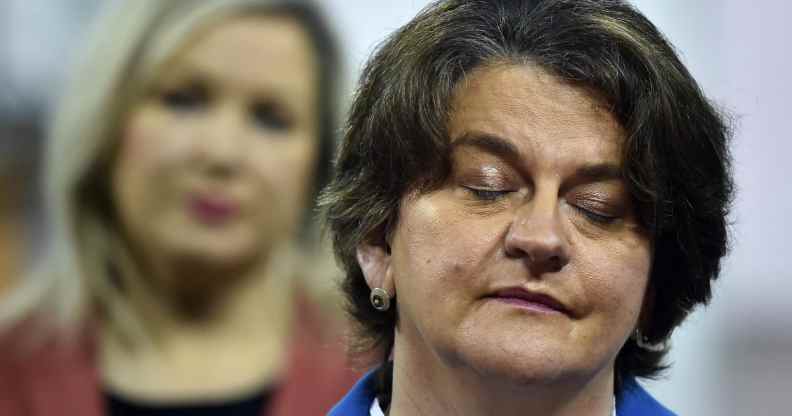Northern Ireland conversion therapy ban wins overwhelming support in symbolic Stormont vote

Arlene Foster. (Getty)
The Northern Ireland Assembly has voted overwhelmingly in favour of a motion calling for the cruel, torturous practice of conversion therapy to be banned once and for all.
The motion was passed by 59 to 24 votes, with all major political parties other than the ultra-conservative Democratic Unionist Party (DUP) voting in favour.
MLAs voted on the motion on Tuesday afternoon (20 April) following a tense debate, which saw elected representatives from across the political spectrum speak on the urgent need for conversion therapy to be banned in Northern Ireland.
The Assembly’s motion recognises that conversion therapy is a “harmful practice” that damages the mental health of those who are subjected to it. Though non-binding, advocates hope the resounding vote in favour will give a clear mandate to the communities minister to pursue a rigorous and extensive conversion therapy ban.
“The outcome of today’s Assembly debate is a positive one and we’re pleased that such cross-party support exists to ban conversion therapy,” said Aisling Twomey, policy and advocacy manager at The Rainbow Project, one of the members of the Ban Conversion Therapy NI campaign group.
“We now need to see work get underway at pace to bring forward legislation before the end of the current Assembly term to ensure conversion practices are banned without delay. We look forward to working with the minister to deliver on today’s mandate from the Assembly in a fair and robust way,” Twomey added.
DUP tried to ‘undermine’ Northern Ireland conversion therapy motion
Before passing the motion, MLAs voted down a controversial DUP amendment which would have removed a line stating that it is “fundamentally wrong to view our LGBTQ community as requiring a fix or cure”.
Campaign group Ban Conversion Therapy NI criticised the DUP for trying to “undermine” the motion and said the party’s amendment was “poorly judged”.
Dr Andrew Cunning, director of faith-based advocacy group Left Side Up, said that “as progressive Christians we are so encouraged to see such widespread support, within the Assembly, for the proposed ban on conversion therapy”.
“It is now clear that the majority of our politicians are in line with a huge swathe of the people in the pews,” Cunning added. “Freedom to do harm is not a freedom that people of faith need.”
Fergal McFerran, Northern Ireland programmes manager at Stonewall, said: “For years, LGBTQIA+ people here have relied either on Westminster or the courts to deliver progress for our community. Today is a signal that provides hope that the Executive can and should be the first government on these islands to deliver a ban on conversion therapy practices in every setting in which they occur.”
There is a lot more work still to do to ensure that the Minister for Communities brings forward effective, comprehensive legislation and that it is passed by MLAs during this mandate.
The news was also welcomed by the Anti Conversion Therapy Coalition (ACTC), an all-island cross-party group calling for the harmful practice to be outlawed in both Northern Ireland and the Republic of Ireland.
In a statement, the ACTC said it is “delighted to see that progress is being made” and said the vote “symbolises the desire for change and complete equality.”
“We know that this is merely a step in the right direction. There is a lot more work still to do to ensure that the minister for communities brings forward effective, comprehensive legislation and that it is passed by MLAs during this mandate. As a campaign, we will encourage people to keep getting involved and to put pressure on their representatives to get this job done once and for all.”
The ACTC also paid tribute to LGBT+ activists in Northern Ireland involved with Ban Conversion Therapy NI and The Rainbow Project.
“It’s grassroots organisations and activists such as these that have gotten this conversation to where it is now,” the group said.
Ministers in Northern Ireland committed to banning conversion therapy in September 2020, and the Department of Communities recently confirmed that it is drafting a sexual orientation strategy which is expected to lay out legislative plans.
Conversion therapy is a devolved matter for Northern Ireland, meaning it could become the first territory in the UK to outlaw the practice while the UK government continues to drag its heels.
At the tail end of Tuesday’s debate, former DUP health minister Jim Wells suggested that conversion therapy should not be banned in religious settings in case a person who “struggles with same-sex attraction” needs help from their pastor.
“I’m a married man of 38 years, I have three children. If I was in a situation where I started to struggle with same-sex attraction – which I’m not, by the way – and I went to my pastor seeking spiritual guidance on that, this motion and the campaign would mean that the only thing he could do was to approve of my lifestyle choice, commend it and wish me all the best,” Wells said.
MLAs from almost every major political party in Northern Ireland spoke of the urgent need for a ban on conversion therapy during the debate, while some spoke of their personal experiences of discrimination.

